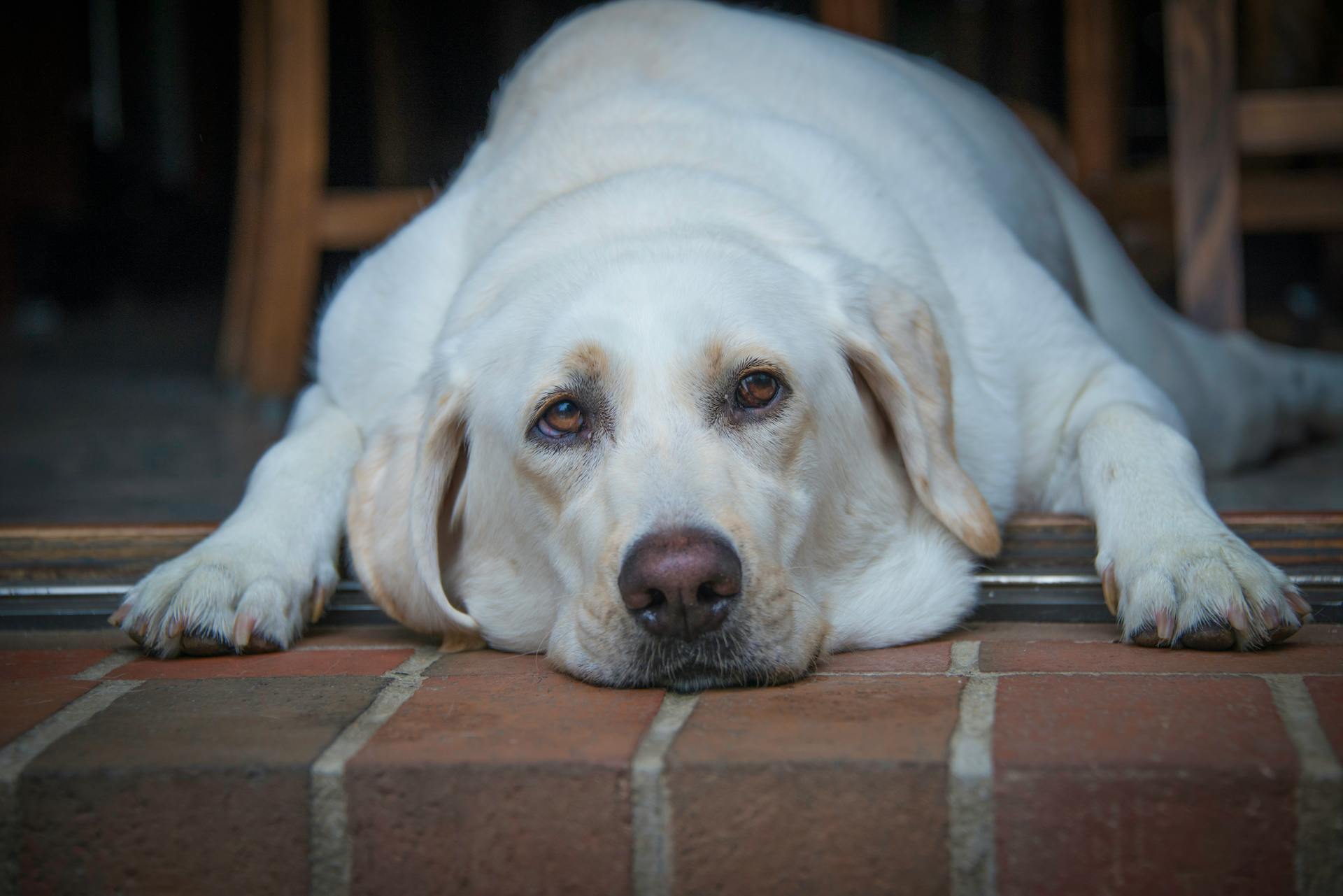
Puppy fat dogs can be a real concern for many pet owners. Excess weight in dogs can lead to a range of health issues, including diabetes, arthritis, and heart disease.
A study found that 52% of dogs in the United States are overweight or obese, making it a common problem. This is often due to overfeeding and lack of exercise.
Dogs need a balanced diet to maintain a healthy weight. The ideal weight for a dog is determined by its breed, size, and age.
Feeding your dog the right amount of food is crucial. A common mistake is overfeeding, which can lead to weight gain and related health issues.
Breed-Specific Considerations
Breed-specific considerations are crucial when it comes to preventing puppy fat in dogs. Certain breeds are more prone to obesity due to their genetic makeup and lifestyle needs.
Beagles, for instance, may be high-energy pups, but they tend to lose muscle mass and become more sedentary as they age, leading to weight gain. Bulldogs, on the other hand, require regular moderate exercise and careful diets to avoid excessive weight gain.
Pugs and Basset Hounds are also more likely to become obese due to their big appetites and short snouts, which can make breathing and exercising a challenge. Dachshunds, with their little legs and long bodies, aren't exactly bred for strenuous activity, making them prone to weight gain.
Labrador Retrievers, notorious for their food obsession, have a genetic mutation that causes them to rarely feel full after meals, leading to overeating and weight gain. Chihuahuas, being a tiny breed, can easily become obese if owners overestimate their food needs or carry them around in purses and bags.
Some breeds are more likely to end up as overweight dogs due to factors like a tendency to lay around if not prompted to exercise, being more likely to overeat, or anatomical abnormalities that make them reluctant exercisers. These breeds include Cocker Spaniels, Cairn Terriers, the Retriever family, Brachycephalic dog breeds, Beagles, Basset Hounds, and Rottweilers.
Here are some breed-specific factors to keep in mind:
- Cocker Spaniels and Cairn Terriers may be more prone to weight gain due to their tendency to overeat.
- The Retriever family, including Labradors, may be more likely to overeat due to their genetic mutation.
- Brachycephalic dog breeds, like Pugs and Bulldogs, may struggle with exercising due to their short snouts and breathing difficulties.
- Beagles and Basset Hounds may be more likely to become sedentary as they age, leading to weight gain.
- Rottweilers may be more prone to weight gain due to their anatomical characteristics.
Remember, while breed-specific factors are important, it's essential to prioritize regular exercise and good eating habits for your dog, regardless of their breed.
Understanding Weight Loss
Your dog's ideal weight is a crucial starting point for any weight loss plan. Knowing this number will help you determine the right amount of calories to feed your dog daily to achieve steady weight loss.
To calculate calories for weight loss, you can use a dog food calculator, but be aware that some dogs may require even fewer calories based on their age and activity level.
Most weight loss foods marketed for canine weight loss are not created equal. They often replace meat content with high levels of carbohydrate fillers, leading to a low-calorie, bulky food that can cause dogs to feel full for only a short time.
A higher protein content in dog food can help a dog feel more satisfied with less begging, making it easier for you to stick to the diet.
To monitor your dog's weight loss, weigh your dog at least every 1 to 2 weeks. Overweight or obese dogs should lose about 1% to 2% of their body weight each week.
You might like: What to Do with Your Dog's Ashes?
If your dog is not losing weight, the daily calories may need to be restricted further. Make sure no one in the house is cheating by giving extra food or treats.
Here are some potential underlying conditions that can contribute to obesity in dogs:
- Diabetes
- Cushing’s Disease
- Hypothyroidism
It's essential to rule out any underlying illnesses before starting a weight loss plan with your vet.
Weight Loss Strategies
To help your puppy fat dog lose weight, it's essential to know their ideal weight and daily calorie needs. Use a dog food calculator to determine this important number.
You should weigh your dog at least every 1 to 2 weeks to monitor their progress. Overweight or obese dogs should lose about 1% to 2% of their body weight each week.
A dog should be fed two to four small portions a day to achieve steady weight loss. This means their total number of calories for all meals and treats must equal the number of calories desired for weight loss.
To ensure your dog gets the right amount of food, you can use timed automatic feeders that dispense food at specific times. This is especially helpful if your schedule makes it difficult to follow a regular feeding schedule.
Feeding high-calorie puppy food to adult dogs can lead to obesity and problems with their bones and muscles. You should switch to adult dog food when your dog reaches adult size.
A few small snacks a day can add up to a lot of extra calories. It's essential to keep track of treats and ensure they're not overfeeding their dog.
Here are some tips to help you gradually change your dog's diet:
- Use a food scale to measure the exact amount of food your dog is eating.
- Replace snacks with healthier options, such as kibble.
- Limit the number of treats and mix in verbal praise instead.
- Follow a vet-approved calorie-restricted diet and start gradually to get your dog used to fewer calories.
By following these weight loss strategies, you can help your puppy fat dog achieve a healthy weight and live a happy, active life.
Measure
To get a clear picture of your puppy's weight, you need to measure their food accurately. Never guess the amount of food your puppy needs, as this can lead to overfeeding and weight gain.
Intriguing read: Puppy Cavapoo
Use an 8 ounce measuring cup to dispense the exact amount of food called for in your calculations. Don't rely on a coffee cup or a food scoop, as these can be inaccurate.
Measuring your puppy's food is crucial for their weight management. It's not just about feeding them the right amount, but also about making sure they're not getting too many treats or snacks.
If you're unsure about your puppy's ideal weight, consult with your veterinarian. They can help you determine the right weight range for your puppy based on their breed and size.
Here's a simple guide to help you measure your puppy's food accurately:
By measuring your puppy's food accurately, you can help them maintain a healthy weight and prevent weight-related health issues. Remember, it's always better to be safe than sorry when it comes to your puppy's health.
Take a look at this: Hush Puppy
Common Health Issues
Puppy fat dogs are at a higher risk of developing serious health conditions, including arthritis, diabetes, breathing difficulties, and cancer. These conditions can be life-threatening and significantly impact their quality of life.
Dogs that are overweight put pressure on their organs, which can lead to disease and even death. Their lifespan is also likely to be shorter than that of their fellow dogs.
Some common health issues in puppy fat dogs include:
- Arthritis
- Diabetes
- Breathing difficulties, including sleep apnea
- Respiratory disease
- Cancer
- High blood pressure
- Joint injuries
Regular wellness exams with your vet can help detect potential health issues early on and track your dog's weight.
What Health Problems Do They Have?
Dogs that are overweight are at a higher risk of developing serious health conditions. These include arthritis, diabetes, breathing difficulties, respiratory disease, cancer, high blood pressure, and joint injuries.
Regular wellness exams are crucial for your dog's health, even if they seem fine. These exams help your vet detect potential health issues early on.
Some of the potential health problems associated with overweight dogs include arthritis, diabetes, and breathing difficulties. These conditions can be serious and even life-threatening.
Here are some of the health problems that overweight dogs are at risk of developing:
- Arthritis
- Diabetes
- Breathing difficulties, including sleep apnea
- Respiratory disease
- Cancer
- High blood pressure
- Joint injuries
Maintaining your dog's ideal weight can add nearly two extra years to their life. This is according to a recent study that found dogs with ideal body weight lived almost two years longer than their overweight siblings.
Neutering
Neutering can have a significant impact on your dog's body and systems, making it easier for them to gain weight. This is because sex hormones control appetite and metabolism in pets.
Spayed or neutered dogs may experience an excessive appetite and lower energy levels due to the reduced effect of these hormones.
Neutering can also change your pet's feeding patterns, leading to begging for more food. I've seen this happen in my own furry friends, and it's not uncommon.
Dogs that have been neutered may require adjustments to their diet and exercise routine to maintain a healthy weight. It's essential to keep an eye on their food intake and ensure they're getting enough physical activity.
Regular check-ups with your veterinarian can help you monitor your dog's health and make any necessary changes to their care.
Broaden your view: What to Do for Your Dog's Birthday?
Hormonal Disorders
Hormonal disorders can be a sneaky cause of weight problems in dogs. Some breeds, like Scottish terriers, are more prone to hormonal conditions like hypothyroidism.
An under-active thyroid gland can lead to lowered hormone production, which can make dogs less energetic and more likely to lounge around. This is because they just don't have the energy to join in on playtime.
On the other hand, an overactive adrenal gland can produce too much cortisol, leading to Cushing's Disease. Dogs with Cushing's Disease don't gain weight overall, but their fat is redistributed to their abdomen, giving them a pot-bellied look.
Here are some examples of hormonal disorders that can affect dogs:
- Hypothyroidism: an under-active thyroid gland leads to lowered hormone production, causing weight problems and lethargy.
- Cushing's Disease: an overactive adrenal gland produces too much cortisol, causing weight redistribution to the abdomen.
Weight Loss Help and Tips
To help your puppy fat dog lose weight, it's essential to know their ideal weight. Your veterinarian can help you determine this and screen for conditions like diabetes, Cushing's Disease, and hypothyroidism that can contribute to obesity.
Your vet may need to design a custom weight loss program for your pet if they're severely overweight. You can also visit the Association for Pet Obesity Prevention for suggested weight ranges for specific breeds.
To calculate the right calories for weight loss, use the Advisor's dog food calculator. You'll need to know how many calories are in a cup of food and feed according to calories. Most dogs will experience predictable weight loss, but some may require fewer calories based on age and activity level.
To monitor your dog's progress, weigh them at least every 1 to 2 weeks. Overweight or obese dogs should lose about 1% to 2% of their body weight each week. If they're not losing weight, the daily calories may need to be restricted further.
If your vet suggests a diet and exercise plan, be sure to follow it carefully. No one in the house should be sneaking your dog extra food or treats.
Intriguing read: Senior Dogs Eat Puppy Food
Weight Loss Help
Your dog's ideal weight is crucial in determining the right diet and exercise plan. Knowing your dog's ideal weight will also help your veterinarian screen for conditions that can contribute to obesity, such as diabetes, Cushing's Disease, and hypothyroidism.

To calculate the right calories for weight loss, use a dog food calculator to determine the daily caloric needs of your dog. This will help you achieve steady weight loss. You'll also need to know how many calories are in a cup of food to feed your dog accordingly.
Monitoring your dog's progress is key to successful weight loss. Weigh your dog at least every 1 to 2 weeks, and aim for a weight loss of 1% to 2% of their body weight each week.
If your dog is not losing weight, the daily calories may need to be restricted further. It's also essential to ensure that no one in the house is cheating by giving extra food or treats.
A study by the Association for Pet Obesity Prevention found that 56 percent of adult dogs are classified as overweight or obese. This highlights the importance of being aware of the signs of overweight dogs, which include a visible waistline, a rounded abdomen, and a lack of definition in the ribs.
To help your dog lose weight safely, take them to the vet. Your vet will check if your dog is overweight due to an underlying illness or not. If there is no underlying illness, your vet will suggest a diet and exercise plan to help your dog lose weight.

Here are some things your vet might suggest to help your dog lose weight:
- A higher protein content in the dog food to help your dog feel more satisfied and reduce begging
- A below-average fat content to help with weight loss
- A below-average calorie content to prevent overfeeding
A higher protein content can help combat muscle loss, which is an unwelcome side effect of dieting.
What Can I Do If I'm Missing Something?
If you're missing something, take a closer look at your calorie intake. Eating too many calories can hinder weight loss efforts.
Pay attention to portion sizes to ensure you're not consuming more calories than you need. A standard serving size is about 3 ounces or the size of a deck of cards.
You can also track your food intake using a food diary or mobile app to help identify patterns and areas for improvement. Keep in mind that even small changes can add up over time.
Frequently Asked Questions
What age do dogs lose their puppy fat?
Dogs typically lose their puppy fat around 13 months of age, after which their waist and ribs should be easily visible. This is a normal part of their growth and development.
Sources
- https://www.womansday.com/life/pet-care/g34016442/fattest-dogs/
- https://www.dogfoodadvisor.com/dog-feeding-tips/dog-lose-weight/
- https://www.midwayvetlovesmypet.com/site/blog/2023/04/15/dog-overweight-signs-symptoms
- https://tractive.com/blog/en/health/what-makes-dogs-fat
- https://www.bil-jac.com/the-dog-blog/posts/how-to-tell-if-your-dog-is-overweight/
Featured Images: pexels.com


